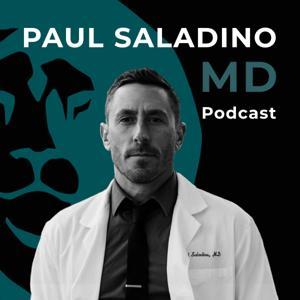[include file=get-in-itunes.html]
Dr. Mark Starr from 21CenturyMed.com and author of Hypothyroidism Type 2 The Epidemic. In my opinion Dr. Mark Starr is the worlds foremost authority on the thyroid gland.
He stopped by today to talk about how thyroid health is connected to our overall health in ways that most people never understand. The thyroid gland happens to attract lots of chemicals, toxins, xeno estrogens and phthalates from plastic, heavy metals and lots of other environmental poisons. Because one of its main jobs it to regulate the distribution of hormones throughout the body, you can see how having low thyroid can affect almost everything we do.
Obviously one of the ways to protect the thyroid gland is to limit your exposure to toxins that damage your thyroid. These toxins are found everywhere in our lives. They're in the food we eat (especially if it isn't organic), the air we breathe (car exhaust, chemtrails, second hand smoke, paints etc), and the water we drink (fluoride, benzene, and chloride).
After you reduce your exposure as best you can to environmental pollution, you'll want to start to support the health of your thyroid gland using things like desecated thyroid supplements and even lugols iodine in different ways.
Since the thyroid gland is linked to diseases like cancer, and heart attacks (the #1 and #2 killers in the western world) it's really important to make sure your thyroid gland is working properly so you can live a long healthy disease free life!
Our hormones are the master switches to health and everything runs off of our hormones. If your hormone levels are off then you're going to have more problems with your health than you ever thought possible.
Did you know that your hormones (and thus your thyroid gland) are linked to...
Appetite issues
Autoimmune conditions, including allergies, lupus, and rheumatoid arthritis
Blood sugar disorders, such as diabetes, hypoglycemia
Cancers
Cardiovascular abnormalities, including high cholesterol, poor circulation, heart palpitations, hypertension (high blood pressure), and low blood pressure
Dental problems
Fatigue and lethargy
Irritable bowel syndrome
Constipation
Heart conditions, including coronary artery disease from accelerated atherosclerosis (hardening of the arteries), arrhythmia (irregular heartbeat), abnormal blood pressure (either too high or too low), diminished cardiac output, weakness of the heart muscle, and congestive heart failure
Hoarseness of voice, difficulty in swallowing, swollen enlarged tongue, and sleep apnea
Candida albicans
Anxiety, depression, memory loss, psychosis, and schizophrenia
Weight gain
Muscular disturbances, including ataxia (lack of coordination), carpal tunnel syndrome, fibromyalgia, and weakness
Neurological impairment --> deafness, tinnitus,vertigo), headaches, migraines, Multiple Sclerosis, numbness and “pins and needles” in nerves)
Pain in joints and muscles --> arthritis and fibromyalgia
Perspiration reduction
Reproductive disorders --> defects, cysts in breasts and ovaries, endometriosis, infertility, and menstrual disturbances
Respiratory conditions, including asthma, emphysema, pneumonia, and chronic sinus infections
Skin disorders, including acne, alopecia (hair loss), boils, dryness, eczema, hives, and psoriasis
Sleepiness and sleep apnea.
Slowed movement and speech
Structural weaknesses/deformities and impaired ability to repair damaged tissues, manifesting in brittle nails, brittle or scant hair (including baldness), degenerating bones (osteoporosis), malformed bones (scoliosis), and thinning and loss of eyebrows
Temperature regulation malfunction: intolerance to heat,




































